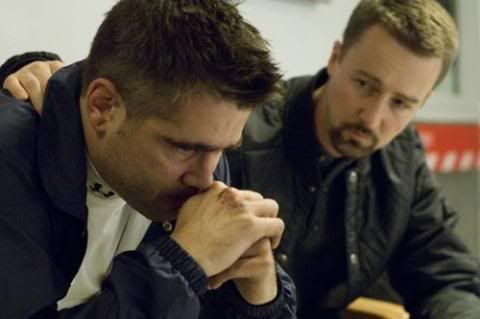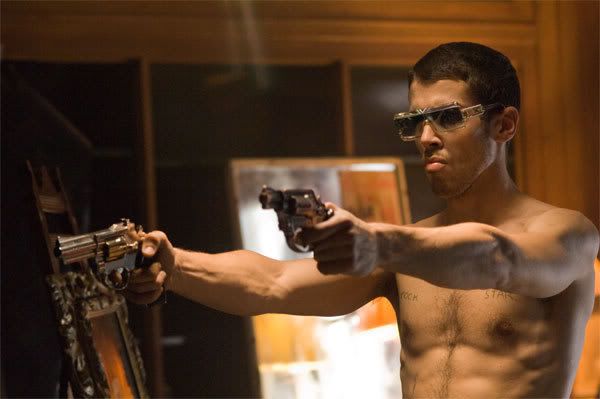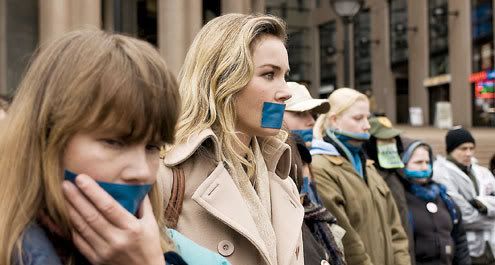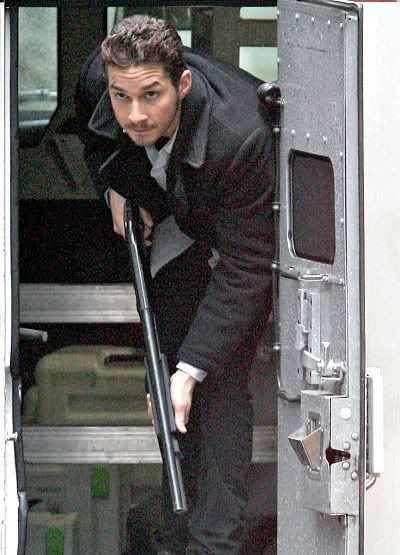directed by Gavin O’Connor
written by Joe Carnahan and Gavin O’Connor
story by Gavin O’Connor, Gregory O’Connor, and Robert Hopes
starring Edward Norton, Colin Farrell, Jon Voight, Noah Emmerich, Lake Bell, Jennifer Ehle, John Ortiz, Frank Grillo, Ramon Rodriguez

Sometimes a film can be awash with cliches and still generate legitimate feelings of great depth and lasting purity. In this film, its true that nothing presented is particularly original and much of it has been seen many times before. Having said that, there is something undeniably poignant about this production and all the formulaic measures lose out to a gripping, intense cop drama that shows the perils of institutionalized violence and how easily corruption can come to the fore.
This is the story of a family of officers who have seen their share of bad deeds gone wrong and the wreckage of lives left behind. Francis Tierney Sr. (Voight) and his two sons Francis Jr. (Emmerich) and Ray (Norton) are all NYPD blue along with Jimmy Egan (Farrell) who is married to Tierney Sr.’s daughter Megan (Bell). As the film opens four cops have been found shot to death and the trail points to the elusive Angel Tezo (Rodriguez). The film slowly peels away the layers as the law works to get to their man with as much alacrity as possible.
This is a very human drama and we learn quite a bit about what makes each of these men tick. Ray has been resigned to a desk because of some untoward incident that landed him in court several years ago. He is convinced by his father to head the task force created to solve the cop killing crime. He’s reticent and reluctantly allows himself to be sucked into the mire and the further he goes in the more disturbing are his findings. He is a man driven by principal and represents the tried and true cop who simply wants to get to the bottom of things as quickly as possible. Francis Jr. is a commanding officer and the men who were gunned down were his men. He himself is tormented by the condition of his ailing wife Abby (Ehle) who is dying of cancer and spends a considerable amount of time in hospital. Jimmy is a hard nosed cop and the more we get to know him the more we realize that his brand of morality strays far outside of the lines of what is commonly acceptable. He’s unscrupulous and brazen but he genuinely adores his wife and small children. He’s a classic contradiction who is designed to portray the many possible aspects of any given personality. Francis Sr. is a leader of men. He’s soft spoken but relatively out of the loop. He doesn’t want to see what is straight in front of him because such realizations are exceedingly costly.
Yet it is far more dangerous to turn a blind eye once the facts start checking out. The entire department comes into question once a series of events begin to be analyzed by Ray and others. The piecing together of the puzzle regarding the night the cops lost their lives is handled with great care and an attention to the emotional agonies being played out. What truly rattles is the simple fact that such circumstances exist and how hard they come down on those who are simply attempting to do their jobs. It’s one of those situations that makes a sympathetic person worry over the nature of such scenarios. Corruption is a difficult pill to swallow for those who retain even a modicum of belief in the efficacy of their local police department. Corrupt cops are nothing new and in fact seem to have become ubiquitous in a number of films of recent vintage including Lakeview Terrace, Street Kings, Righteous Kill and The Departed.
There are scenes here suggestive of great cruelty that elucidate the mind of an individual who has allowed himself to be dragged along such a sordid course that its difficult to reconcile his behavior with the sweetness he displays on other occasions. Still, such is the nature of how far he has fallen and how easy it is to rationalize such behavior when you are caught up in it. This behavior is presented in a matter of fact fashion and suggests terrible possibilities that are in fact realities in far more places than we care to admit. Francis Jr. admits to allowing certain measures of grift as long as his men get their jobs done. But he remains ignorant of just how far some of them are taking the liberties he has bestowed upon them. He is not part of the underlying nefarious schemes and only learns of them once the evidence begins to pile up. Yet he is a strong, upstanding man with personal integrity that ascends far above his personal gratification. Subsequently he takes a step that is noble, princely and thoroughly necessary. It’s a sacrifice of the highest rank despite the inevitable fallout which follows.
Often this film feels like an requiem for all those who have lost their lives in the line of duty. There is a tenderness here that stems from, I think, a deep reverence for the special place our society reserves for those who have paid the ultimate price for protecting and serving their community. The blight that threatens to consume the force is slowly but surely eradicated as the film progresses culminating in a form of just desserts that allow for a brand of closure.
There is tremendous sadness throughout this film. From the melancholy that covers Ray like a shroud to the brave fight put up by Abby there are moments of true heartbreak that drive the film toward its necessary conclusion. Each character seems to be fighting something or other and it feels as if they imagine that if they give in they themselves will be swarmed under into oblivion. This is most true when Francis Sr. is being a father. He transfers one hard line for another and pleads with Ray to take a step that nobody should ever have to take. He is horrifically torn between his duty to his sons as a man they can trust and respect and his obligations to his profession. The tension plays on Voight’s face as his character attempts to maneuver himself through a field of snakes and scorpions.
The performances in this film are all uniformly excellent. Jennifer Ehle has but four scenes but she demonstrates a resolve that is as refreshing as it is difficult to contemplate. Edward Norton gives yet another nuanced turn as a man who discovers truths that are deeply unsettling and that challenge the very foundations upon which he has placed his trust. Colin Farrell is a brooding, unharnessed mess of fears and frustrations. Jimmy is a ragged character who cannot help but take advantage of certain circumstances when he discovers them to be to his advantage. Farrell is perfectly cast as the tenacious, fiery messenger of despair and terrible desire. Jon Voight gives a totemic performance here that reverberates throughout the film. Noah Emmerich is a thrill to watch as his character juggles his career and the trauma at home. Emmerich is the real heart of this film and enlightens with his deft, agile performance.
Overall, this film may indeed consist of myriad cliches but it works through them and ultimately the result is a deeply engrossing film that projects emotional truths that ring through to the conclusion. There is a wounded sensibility that haunts the film as it relates a story that profound in its familiarity. Each character is complex and their actions reflect their own peculiar moralities. Corruption is nothing new in cinema and either is the struggle between the order of the old boys network represented by those who have allowed certain infractions to slip through the cracks for years (We protect our own) and everyone else who simply wants to do the right thing and go home to their wives and kids. This film does little narratively to shed much light on this struggle but it nevertheless is a thoughtful reminder of the tenuous grip most of us have on who we think we are and what we might become.



